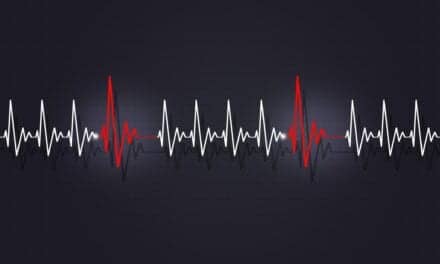In observation of National Atrial Fibrillation Awareness Month, a survey sponsored by iRhythm Technologies reveals that nearly half of Americans lack awareness about the primary symptoms of this common yet potentially deadly heart rhythm disturbance. Additionally, the survey of 1,013 American adults found that fewer than 20% of respondents could correctly identify medical conditions such as sleep apnea and diabetes as risk factors for atrial fibrillation (Afib). Afib is the most common type of cardiac arrhythmia, affecting nearly 2.7 million people in the United States and increasing the risk of a stroke fivefold.
“Symptoms of Afib can vary, but typically include racing or pounding sensations in the chest, heart palpitations, shortness of breath, dizziness, or fatigue. Patients with suggestive symptoms–especially those over age 65 or with medical conditions that increase the risk or worsen the consequences of Afib–should be evaluated using longer term cardiac monitoring,” says Emerson Liu, MD, a clinical cardiac electrophysiologist at Allegheny General Hospital in Pittsburgh, Pa, in a release. Because the incidence of Afib increases with age, the number of cases in the United States is expected to increase significantly in the coming years as the population ages.
Low Awareness of Symptoms
Only a third of Americans are aware that Afib symptoms can also include shortness of breath (37%), dizziness or light-headedness (34%), and fatigue (27%). Even fewer respondents (21%) are aware Afib may have no symptoms at all.
Low Awareness of Risk Factors
While the survey showed that nearly half of Americans are aware that the risk of developing Afib is increased by a family history of the condition (48%) and high blood pressure (43%), far fewer are aware that a number of medical conditions are also risk factors for Afib: sleep apnea (16%), diabetes (14%), excessive alcohol consumption (11%), thyroid problems (7%), having major surgery (6%), lung disease (5%), and kidney disease (3%).
Increased Stroke Risk
Data show that Afib elevates a patient’s risk of ischemic stroke by five times, making its timely diagnosis critical so that proper treatment may be initiated to prevent a stroke. The survey revealed that while nearly half (45%) of Americans are aware the condition may increase stroke risk, only 17% are aware of the extent of the considerable (fivefold) increase in risk.
“Physicians need to know if stroke or TIA patients have an underlying cardiac arrhythmia which may have caused their neurological event, as this will impact treatment to help prevent a recurrence,” stated Hooman Kamel, MD, a neurologist at New York-Presbyterian Hospital/Weill Cornell Medical College.
New Digital Technology to Improve Afib Diagnosis
While Afib can be difficult to detect because its symptoms occur sporadically–or, in some cases, patients have no symptoms–new digital healthcare technologies are improving doctors’ ability to diagnose the condition. For this, iRhythm Technologies touts its ZIO Service, a small, wearable patch that continuously records a patient’s heartbeats for up to 2 weeks. The heartbeat data is then analyzed and a report is shared with the patient’s doctor using a secure website, to enable proper Afib diagnosis and treatment if necessary. The ZIO Service is FDA-cleared and its performance is backed by multiple peer-reviewed, published studies.
“Continuous long-term cardiac monitoring is essential to detect Afib, which may occur infrequently and often has no symptoms,” Kamel says. “However, many of the available monitoring options do not capture enough data or record for a long enough period of time, are burdensome for patients to wear, or are too expensive.”



